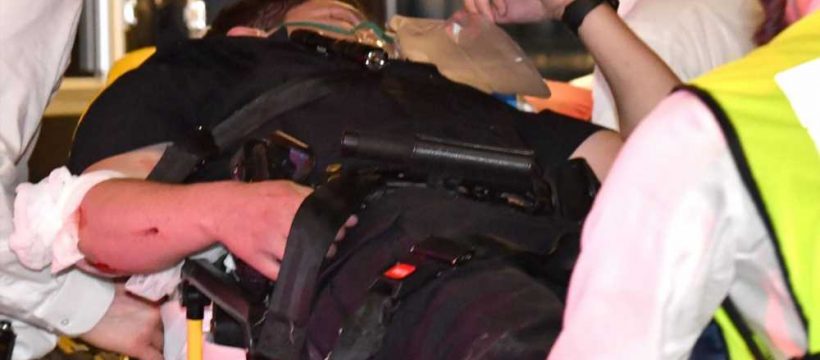NYPD cops have a new reason to walk their beat on eggshells: Officer injuries are spiking.
Amid a spate of assaults on police, including a melee at Brooklyn’s Marcy Projects that left three cops hurt as well as a rash of water-dousing attacks, injuries rose 12.5 percent in the second quarter over the first three months of the year, NYPD data show.
That’s up 2.5 percent over the same time period in 2018 and up 3.5 percent through June over the first half of 2018.
With 1,120 total injuries, April to June this year was the bloodiest quarter for cops since the final three months of 2016, the earliest time period of publicly available data.
Injuries aren’t just knee scrapes; 35 officers were “seriously” hurt and 47 suffered “substantial” injuries, the NYPD says.
Police-union president Patrick Lynch — who’s been warring with NYPD brass and Mayor de Blasio in the wake of officer Daniel Pantaleo’s firing — blamed the uptick on “anti-police lawmakers and failed NYPD leaders” who have “emboldened criminals to assault cops and resist arrest.”
“Whenever a cop says, ‘You’re under arrest’ and a perp says, ‘I’m not going,’ it’s a recipe for somebody to get hurt,” Lynch told The Post. “Unfortunately, that scenario is becoming more and more common, and too often cops are getting the worst of the encounter.”
No precinct was hit harder by cop injuries than the 52nd in central Bronx, where the crime rate is among the highest in the borough.
Thirty-three officers were hurt there in the second quarter. One of them, a female officer, suffered a gash to her arm when a “flailing” suspect slammed her into a sharp piece of metal on a garage door following a foot chase, according to a police source.
In response to the injury uptick, the NYPD said “any attack on our police officers is unacceptable. People must be held accountable if they lay a hand on any police officer.”
It noted that “serious” and “substantial” injuries declined from 2017 to 2018 and are on track to drop again this year.
But one ex-cop fears that trend could reverse in the wake of Pantaleo’s firing.
“Here is an example of when your leaders don’t back you up,” said John Jay College professor Joseph Giacalone, a former NYPD sergeant. “The public takes on that persona and says, ‘We can do this.’ ”
Source: Read Full Article

